Laura Dern Wilson
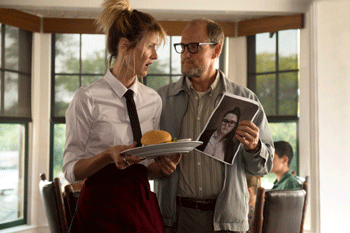
Laura Dern Wilson
Cast: Woody Harrelson, Laura Dern
Director: Craig Johnson
Genre: Comedy
Running Time: 94 minutes
Synopsis: Woody Harrelson stars as Wilson, a lonely, neurotic and hilariously honest middle-aged misanthrope who reunites with his estranged wife (Laura Dern) and gets a shot at happiness when he learns he has a teenage daughter (Isabella Amara) he has never met. In his uniquely outrageous and slightly twisted way, he sets out to connect with her.
Wilson
Release Date: May 25th, 2017
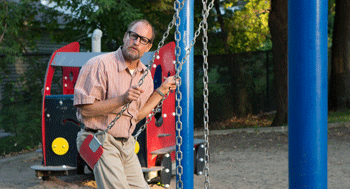 About The Production
About The Production
A cantankerous, middle-aged eccentric goes in search of the daughter he never knew he had in Wilson, an imaginative and often hilarious journey of self-discovery from director Craig Johnson (The Skeleton Twins). Written by Academy Award®-nominated screenwriter Daniel Clowes and based on his iconic graphic novel of the same name, Wilson is a sharply observed portrait of an overly candid misfit bumbling his way through life, often with haphazard success.
An acclaimed author and Oscar®-nominated screenwriter Daniel Clowes, who also wrote the screenplays based on his books Art School Confidential and Ghost World, says Wilson's wildly dysfunctional adventures have nothing to do with the quiet life he leads with his wife and 5-yearold son. He acknowledges that he was inspired to imagine Wilson's journey by an experience he shares with the character. 'My dad was in the hospital with terminal cancer, just as Wilson's is at the beginning of the movie," he says. 'I was sitting by his bedside and contemplating the void and I just wanted to be in that room with him. I brought my little sketchpad and started doodling light and funny little comic strips, to keep myself from getting overwhelmed."
Eventually a character began to emerge, at first no more than a stick figure, but with the oversized personality of a man who speaks the absolute truth, whether anyone wants to hear it or not. 'I was cracking myself up," Daniel Clowes admits. 'Wilson is a bit of a jerk, but he's also a lonely guy trying to navigate his way through life. I had a friend in college who constantly talked about this guy Wilson who I had never met. To this day, I don't know if that was his first or last name, but he took on a kind of mythical quality for me."
Filmmaker Alexander Payne, at one time, optioned the book several years ago and asked Daniel Clowes to adapt it for the screen. 'It was a great opportunity to take the comic and give it a new life," the writer recalls. 'I had millions of comic strips that were little fragments of life and I eventually found a story in the midst of all that. Coming into the screenwriting process, I felt like I already had a great outline for the film."
Daniel Clowes is quick to assure people that his misanthropic cartoon anti-hero Wilson is not a thinly veiled version of himself. 'I don't think I'm much like Wilson at all," he says. 'I'm kind of reserved and careful in what I say. On the page, I can be very blunt, and perhaps even cruel in a way that I don't intend, but my goal in my work is to not filter myself the way I do in real life."
At the time, Craig Johnson, director of the 2014 dark comedy The Skeleton Twins, was looking for his next project. Craig Johnson was already a fan of Daniel Clowes' work, which he says takes people at the edges of contemporary life and puts them front and center, daring the audience to contend with them. 'Daniel Clowes is interested in what you might term the freak, the outsider, the misfit " the people most easy to write off," says the director. 'His work is about the weirdos on the fringes and he's not afraid to show them, warts and all, but then he shows us a way to respect them. He captures what makes them odd and unusual, but presents them as human beings with a real emotional life. At first you might be laughing at these people, but Daniel Clowes' has a way of unfolding the layers to find the humanity within them."
After seeing The Skeleton Twins, which stars Kristen Wiig and Bill Hader as estranged siblings who come together after a series of near-tragedies, Daniel Clowes says he saw immediately that Craig Johnson had the right sensibility to direct Wilson. The pair then met in Oakland, where Daniel Clowes lives. 'It was clear that we were on the same page as to what we wanted this film to be."
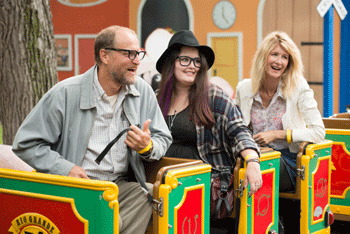 The movie expands the events of the book beyond its single-page graphic novel style vignettes, developing the characters further and filling in the blanks, according to the author. 'In the book, I really wanted the readers to picture for themselves the action that takes place between the images. But of course a film is a very different thing and those spaces are interpreted, ' says Daniel Clowes.
The movie expands the events of the book beyond its single-page graphic novel style vignettes, developing the characters further and filling in the blanks, according to the author. 'In the book, I really wanted the readers to picture for themselves the action that takes place between the images. But of course a film is a very different thing and those spaces are interpreted, ' says Daniel Clowes.
Wilson, says Craig Johnson, finds a balance between the funny and the heartbreaking that is right in his wheelhouse. 'It made me laugh out loud," says the director. 'Very few scripts have done that. On one hand, it felt like real life and yet it was absolutely hilarious. I'm always looking for something that's funny as well as humane and this script was both."
Translating a graphic novel to the screen comes with built-in advantages, says Johnson, noting that the comic pages are an art form closely related to cinema. 'They are both stories told in pictures, with dialogue, camera angles and editing, think of storyboards. For that reason, I believe that is what makes comic page artists particularly adept at screenwriting. Daniel Clowes' version was already beautifully cinematic, I just had to avoid screwing it up."
Observes Daniel Clowes. 'Both have this synergy. Images inspire dialogue and vice versa. It all comes alive of its own volition."
Craig Johnson elevated the material in part through his ability to find just the right actors for each role and then guide them to inspired performances. Says Daniel Clowes, 'It was a long process, but worth the trouble. It's an unusual screenplay because there are several main characters. I've tried to write every character, even if they have one or two lines, as though they have a big backstory. They all have a purpose and a place in Wilson's world."
Jared Goldman, who executive-produced The Skeleton Twins, signed on as a producer of Wilson. 'Craig Johnson is thoughtful and collaborative," says Jared Goldman, whose numerous other credits include Kill Your Darlings and The Magic Of Belle Isle. 'He's appreciative of other people's input, but ultimately he has no problem making a decision, which makes him an ideal director in my opinion. You know he's ultimately steering the ship." A longtime Daniel Clowes fan, Jared Goldman says the work goes far beyond what one would expect of a typical graphic novel. 'His writing is so incisive, the descriptions are almost surgical. That sort of ability to capture language is unusual and a joy to see."
Mary Jane Skalski, also a producer on the film, marvels at Daniel Clowes' economy as a writer. 'He uses the fewest words possible and makes every one count," she says. 'The script seems simple, but every scene accomplishes 10 different things effortlessly, and you don't even notice how many things it's doing at once."
 Craig Johnson's sensitive treatment of his protagonist makes the film's central character surprisingly relatable despite his outrageous behavior, according to Jared Goldman. 'He's an extreme extrovert, but he's also very lonely. There's a poignancy as well as a playfulness to him that makes him someone we want to follow. He is is a big-hearted slob, a lonesome bachelor, a devoted father and husband, an idiot, a sociopath, a delusional blowhard and a delicate flower. You can't beat that."
Craig Johnson's sensitive treatment of his protagonist makes the film's central character surprisingly relatable despite his outrageous behavior, according to Jared Goldman. 'He's an extreme extrovert, but he's also very lonely. There's a poignancy as well as a playfulness to him that makes him someone we want to follow. He is is a big-hearted slob, a lonesome bachelor, a devoted father and husband, an idiot, a sociopath, a delusional blowhard and a delicate flower. You can't beat that."
Audiences will enjoy the movies many humorous moments, but they will also recognise Wilson's deeply flawed humanity and be touched by it, believes Craig Johnson. 'Wilson has a tone unlike anything else I've seen," he adds. 'It's got a wicked sense of humor with a real emotional core that has everything to do with Wilson himself. He has hopes and dreams just like all of us, but he just keeps getting in his own way and that's part of the fun of the movie. He's the guy who will sit a little too close to you in a coffee shop when there are plenty of other seats. And still, you're pulling for him."
At his first meeting with the producers of Wilson, Craig Johnson brought up the idea of Woody Harrelson playing the title role. Woody Harrelson has been in the public eye for more than 20 years, since his 1995 breakout role as dim but lovable bartender Woody Boyd in the long-running sitcom 'Cheers." Now a two-time Oscar nominee, the actor has become at least as well known for his dramatic performances in films including The Messenger, The People Vs Larry Flint, No Country For Old Men and the acclaimed HBO series 'True Detective."
The role required Woody Harrelson to call on his skills as both a dramatic and comic actor, according to Craig Johnson. 'Woody Harrelson brings an inherent likability to every role," says the director. 'He's one of those guys you can't stay mad at no matter how badly he might behave. Wilson does some pretty offensive things, but when you have Woody Harrelson there with his charming half smile, you just forgive him."
Daniel Clowes had recently seen Woody Harrelson as Detective Marty Hart in 'True Detective" when the actor's name came up. 'He was almost menacing," the writer says. 'Woody has a quality that can be almost scary. Then I started thinking through his history and remembered of course that he is also he's actually very funny. He is a brilliant comedian, with both the power and the sorrowfulness that Wilson needs. I realised I liked the idea of Wilson having a certain soulfulness to him, beyond just being an amusing schlub."
After seeing Woody Harrelson play Wilson, any doubts Daniel Clowes had were immediately erased. 'His stance and his facial expressions are perfect," the writer says. 'To see Wilson and to hear his voice just as I imagined it is very strange. It's like having your dreams projected onto a wall for everybody to see."
Producer Skalski describes the character as an 'optimistic curmudgeon." 'Daniel Clowes' writing has so many layers to it and Woody Harrelson got that," she adds. 'He brought a great spirit of hopefulness to a character that would be easy to play as just a grumpy guy. In Woody Harrelson's hands, he became an enthusiastic, engaged person who sees the world in his own way."
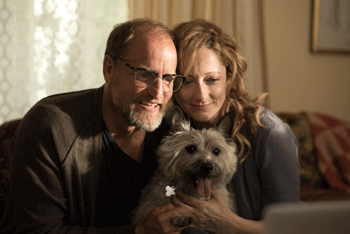 The character retains his edge, but Woody Harrelson adds a sense of playfulness to Wilson that wasn't on the page, according to Jared Goldman. 'The ways in which Woody Harrelson and Craig Johnson have modulated his performance provided us with an embarrassment of riches in the editing room. He brings a real warmth and approachability to the character."
The character retains his edge, but Woody Harrelson adds a sense of playfulness to Wilson that wasn't on the page, according to Jared Goldman. 'The ways in which Woody Harrelson and Craig Johnson have modulated his performance provided us with an embarrassment of riches in the editing room. He brings a real warmth and approachability to the character."
After years of concentrating on dramatic work, Woody Harrelson had a hankering for lighter fare, the actor says. 'Wilson has real-life pathos as well as unbelievably hysterical moments. It's not a slapstick comedy. In fact, it's not typical in any sense. Daniel Clowes has created an amazing character. Most people won't say what they're thinking, but that's not Wilson's way. He's an intriguing character with a lot of levels. Some of his behavior is so painful to watch that you cringe, but you cringe so often that you have to laugh. You may not believe the things he says and does, but in the end you do love him."
He credits Craig Johnson with helping him fine-tune his performance. 'He really knows how to talk to actors," says Woody Harrelson. 'Craig Johnson says just the right things to help liberate your thinking. If something looks false, he reads that right away. But I love the way he does it."
Woody Harrelson also offers high praise for Laura Dern, who plays Pippi, Wilson's ex-wife. 'Working with Laura is one of the greatest experiences I've ever had," says the actor. 'She had amazing insights into the characters and was able to pierce right through to the core of what's vital in a scene."
Wilson and Pippi divorced rancorously 17 years earlier and haven't seen each other since. After more than a decade of being caught up in drugs and prostitution, Pippi is just getting her life back on track. 'She has had a rough life since she's been away from Wilson," says Craig Johnson.
'Pippi has a volcanic temper, and yet she's got a lot of heart and humanity too. When Wilson comes back into her life, he is a destabilizing force for her. It takes someone like Laura Dern to bring out both the volatile, dangerous parts of Pippi, as well as the beautiful and humane elements. There's never just one thing happening on Laura Dern's face. You see the full range of emotion. You can see the weather change in one or two seconds. That's a rare skill for an actor and something that was critical to making Pippi someone the audience gets on board with."
While the script hews closely to the graphic novel, Daniel Clowes allowed the actors fill in some of the blanks, according to Laura Dern. 'Woody and I were able to take our characters a little deeper," she explains. 'Wilson and Pippi have evolved a bit from what who they were on the page. She's impossible, but trying very hard to get herself together, meaning being off the drugs that have really taken her down. She has to put one foot in front of the other, keep a roof over her head, hold down an actual job and try to not let her temper get the best of her."
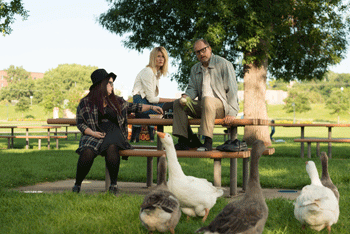 The actress was touched by Wilson's longing to find Pippi and be with his true love again. 'He is also grieving the fact he no longer has a family, so when he discovers that she had their child after they parted, he becomes obsessed with getting to know his little girl. When they finally meet their daughter Claire, it's startling to see how similar her mannerisms and temperament are to theirs. They recognise that in fact she was lucky not to have had them around, but they also see that she carries a part of them deep inside that makes her a direct, honest person."
The actress was touched by Wilson's longing to find Pippi and be with his true love again. 'He is also grieving the fact he no longer has a family, so when he discovers that she had their child after they parted, he becomes obsessed with getting to know his little girl. When they finally meet their daughter Claire, it's startling to see how similar her mannerisms and temperament are to theirs. They recognise that in fact she was lucky not to have had them around, but they also see that she carries a part of them deep inside that makes her a direct, honest person."
Despite both characters' obvious flaws, Laura Dern was captivated by the strength of Wilson and Pippi's love all these years later. 'In a lot of ways, they have the most perfect love story I've ever had a privilege of being a part of," she says. 'Their longing to be better people, to never shy away from the truth and to be accountable for themselves is admirable. As an actor, I find it interesting to play a character that can be easily judged and yet is someone to aspire to as well. She's complicated and elusive. That's the kind of storytelling I always long to see."
Claire, the daughter that Pippi gave up, is played by Atlanta-based actress Isabella Amara. Isabella Amara, who recently played a younger version of Melissa McCarthy in The Boss, was found during an extensive talent search. 'It is a really difficult role," says Skalski. 'She's a teenager who doesn't quite know her place in the world and this crazy couple inserts themselves into her life."
Craig Johnson was looking for two qualities in the actress he cast as Claire. 'She had to break our hearts and make us laugh," he explains. 'Isabella does both. Claire is a high-school outsider who is going through a really rough period. Wilson freaks her out at first but then she starts to get a sense of why she is the way she is."
Claire shares Wilson's biting wit and unwillingness to compromise. Her unmitigated honesty intrigued Isabella Amara. 'She just doesn't really care about what anyone thinks," says the young actress. 'She always stays true to herself and makes sure her point gets across. When I read the book, what stood out to me was how like Wilson she is. He's a very honest character, even when that means being brutal."
Claire first encounters her birth parents Wilson and Pippi after they track her down at the mall, she is being bullied by a group of other kids and Wilson defends her. 'Claire is lonely and very depressed," says Isabella Amara. 'She just wants to be loved and her adoptive parents are never around. When Wilson comes into her life, it seems like a great thing for her. He's giving her all this love and attention, as odd as it is."
Working with Woody Harrelson was a fantastic experience, says Isabella Amara. 'He makes everyone laugh, doing random improvs that you just don't expect. It's hard to stay in character because you just want to laugh. Woody Harrelson stays true to who Wilson is in the book but he steps up to a whole new level. It's quirky and fun, but it also brings real depth to the character."
The third important woman in Wilson's life is Shelly played by Judy Greer (The Descendants), his dog sitter and confidante. At his lowest moments, she is there for him and as the movie progresses, her role in his life grows. 'Judy is so wonderful as Shelly," says Skalski." Wilson and Shelly bring out the best in each other and Judy makes Shelly a warm and no-nonsense companion for him."
Judy Greer says she wanted the role so badly she wrote Craig Johnson a letter about her ideas for the character. 'When we first got in the room for my audition, I just wanted to know where he saw her," says the actress. 'Was she an outcast weirdo or a super open, earthy hippy chick? Is she stupid? Is she smart? Is she lonely? Is she content? We batted around a lot of different ideas for her. Essentially, she is everything that Pippi isn't. Shelly is very nurturing and maternal. She's very much a caregiver and someone that Wilson could really use in his life."
Her enthusiasm and natural warmth quickly won her the role. 'Judy Greer is just a tonic of a person," says Craig Johnson. 'She glows with humanity and that's what Shelly needed. We know that when Wilson is with her he is in really good hands."
The film manages to avoid the many clichés that often crop up in stories about men in midlife crises, Judy Greer says. 'This man is cranky and curmudgeonly, but he is still searching for meaning in his life, and trying to learn how to love. Woody brings a childlike innocence to the role, which is extremely disarming. Another actor might have brought a harsher quality. At his crankiest, even when Wilson is hating on life and people, he seems so vulnerable."
Even the smallest roles in the film are filled by experienced actors who committed to the project based on the quality of Daniel Clowes' writing. 'Daniel Clowes did an incredible job with all the characters, so it was easy to attract incredible actors," says Craig Johnson. 'It's rare to see minor roles this well conceived. Tremendous actors did us a huge favor by jumping into smaller roles."
The film is populated with an ensemble that includes Cheryl Hines, Margo Martindale and David Warshofsky, as well as numerous local actors from Minneapolis' renowned theatre scene.
Cheryl Hines,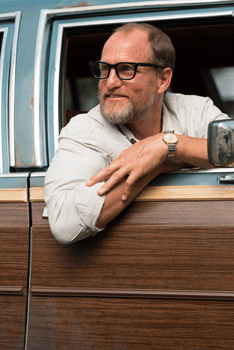 best known for playing long-suffering Cheryl David on 'Curb Your Enthusiasm," gives a bravely unlikable performance as Polly, Pippi's straight-laced sister. Safely ensconced in a comfortable suburban house with her husband and kids, Polly is unable to conceal her distaste for her sister's life " or for Wilson. 'The world of Wilson is realistically complicated," says Hines. 'And the characters are complicated. I was fascinated by the fact Polly and Pippi grew up together. They had the same formative experiences, yet Polly manages to have a conventional suburban life and Pippi has just gone off the rails. My character is totally passive aggressive and extremely judgmental, but I also think you can understand why she feels this way."
best known for playing long-suffering Cheryl David on 'Curb Your Enthusiasm," gives a bravely unlikable performance as Polly, Pippi's straight-laced sister. Safely ensconced in a comfortable suburban house with her husband and kids, Polly is unable to conceal her distaste for her sister's life " or for Wilson. 'The world of Wilson is realistically complicated," says Hines. 'And the characters are complicated. I was fascinated by the fact Polly and Pippi grew up together. They had the same formative experiences, yet Polly manages to have a conventional suburban life and Pippi has just gone off the rails. My character is totally passive aggressive and extremely judgmental, but I also think you can understand why she feels this way."
Hines believes there's someone for everyone to identify with in the film. 'And that's going to allow you to laugh at things you think maybe you shouldn't be laughing at," she says. 'Craig has grounded this in a very genuine place. He created a unique tone for it. There's certainly tragedy in this story, but you are going to go for a ride. It won't always be comfortable, but it will always be entertaining."
Wilson was originally set in Oakland, California, where Daniel Clowes has lived for many years. He set all the action of the film within five blocks of his house so he would be able walk to set every day. As it turned out, however, the filmmakers decided to move the shoot halfway across the country to the Minneapolis-St. Paul area.
'When we realised we weren't going to be able to shoot in Oakland for budgetary reasons, we went looking for a midsize, progressive, gentrifying American city," says Craig Johnson. 'We were thinking west of the Mississippi and so we looked at places like Seattle and Portland and Denver. Wilson's world is unique. You see a lot of the old vintage restaurants and apartments and stores that are now being fixed up. The laundromats are going away and the artisanal coffee shops are moving in. Minneapolis-St. Paul had everything we were looking for. The neighborhoods and lakes and restaurants and stores were already in the story, so it really worked out well."
Unlike working from a spec script or an adaptation of a traditional novel, Daniel Clowes' original drawings provided Craig Johnson with readymade storyboards for the film. 'We had the template ready to go," the director says. 'The script is different than the graphic novel in numerous ways, but many things, like the color palette, were pulled directly from the book. It's colorful, but muted."
Working with cinematographer Frederick Elmes, whose work on unconventional classics like Blue Velvet and Wild At Heart have made him legendary in the film industry, the director tried to recreate the feeling of a graphic novel on the screen, framing shots in a way that creates the sense of foreground. 'Watching Fred work was phenomenal," says Skalski. 'He paints with light. Looking at the monitor, we were just blown away."
Production designer Ethan Tobman created more than 50 individual setups for the film. 'I always felt this was a story about the vanishing of the America of the '70s and '80s as well as about a man who has trouble communicating. Wherever possible we really played with the idea that old storefronts, laundromats, karate studios and hair salons are suddenly becoming the Gibraltar Coffee Shop or the Organic Olive Oil Laboratory."
Craig Johnson issued the crew with precise instructions about how he wanted the film to look. 'Craig Johnson is one of the most interesting directors I've ever worked with," Ethan Tobman says. 'He's so focused. He arrives at his own opinion about things as small as a pen or as large as an entire location. He also assembled a fantastic team. We all worked closely to calibrate a look that captured the feeling of the graphic novel. Everyone was on the same page early on about using color and texture and shape to make everything just a little left of center " a little more Wilsonian, if you will."
Wilson's apartment is intricately dressed and packed with clues to his personality. The production designer brought in five trucks filled with 4,000 books and at least 35 crates of magazines, bottle caps, beer cans, matches, old tins and beat-up board games. 'We had to organize it in a way that only makes sense to Wilson," says Tobman. 'Woody had a lot of fun dressing the set with me. He'd say in that classic Woody drawl, -We're killin' it man, we're crushin' this.'"
Costume designer Christopher Peterson found a wealth of visual clues for the characters' clothing in Daniel Clowes' drawings. 'The challenge is to stay true to the original intent of what Daniel Clowes created," he notes. 'But there was always room to play."
The designer and the director decided Wilson would be the exact opposite of fashionable. 'His clothes are utilitarian," Craig Johnson says. 'He wears a pair of khaki pleated pants that he bought at the mall 25 years ago. He keeps them until they get literally unwearable. Add the same jacket, the same inexpensive mall shirt, some comfortable, clunky shoes and that's his uniform. He thinks fashion is the most ridiculous thing in the world and would probably tell you all about it if you bumped into him in a coffee shop."
Peterson says his initial description to Harrelson of the character's wardrobe as 'vintage" resulted in a small misunderstanding. 'I think Woody was expecting a cooler, more curated, ironic vintage style," the designer says. 'But this is vintage in the sense that Wilson has had it so long; it's really just old. I was able to pull from thrift stores as well as Wal-Mart and Target to put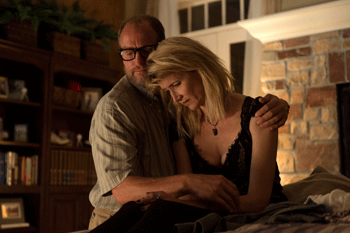 together the unmade bed of a guy that Wilson is."
together the unmade bed of a guy that Wilson is."
While Wilson's image is true to the graphic novel, Pippi presents very differently on screen. Peterson worked closely with Laura Dern to develop a signature look for the character. 'Pippi as drawn is frumpy, sad and withdrawn. But Laura Dern wanted something that conjured up her history. We explored where her look stopped in time. When did she think she was cool? We decided it was the era of badass women of rock from the '80s and '90s " people like Chrissie Hynde and Debbie Harry, with a little bit of Courtney Love thrown in for good measure."
For Claire, Peterson found a balance between contemporary and nostalgic, referencing millennial Goth as well as the quirky originality of a 1980s John Hughes movie heroine. 'Isabella was fearless about putting on all kinds of crazy stuff," he says. 'We came up with the hat and the glasses, and ended up with something like Molly Ringwald dressed all in black."
Jon Brion, the musician, songwriter and composer perhaps best known for his collaborations with filmmaker Paul Thomas Anderson, provided a score that was unique and perfectly suited for the film.
'There is simply no better film composer out there, especially when it comes to offbeat movies with unusual tones," says the director. 'His work on Punch Drunk Love sent me over the moon. That is one of the strangest, most enchanting and beautiful scores of all time. I thought he would be perfect for this film, but never in a million years did I think he would do it."
The filmmakers were looking for a score that balanced all sides of Wilson's conflicted psyche, the 'salty and the sweet," as Craig Johnson says. 'We also wanted it to have a somewhat throwback feel," he continues. 'Wilson is a guy who is uncomfortable in the modern world. When Jon and I realised we were both big fans of Henry Mancini that inspired us to create a sound that is a little jazzy and a little romantic, with a wink to classic caper movies."
Eventually a series of three musical themes were developed that reflected Wilson's longing for human connection, his curmudgeonly, me-against-the-world attitude, and his sweet, almost romantic nature. 'The first is kind of society dropout jazz riff for when he's alone," says Craig Johnson. 'There's also a classically romantic -love' theme for when he's with Pippi and a contented, -fatherly' theme for when he is connecting with Claire. These themes appear and reappear in various forms all throughout the film and help bring to life the full portrait of cranky, spiky, lovable Wilson."
Looking at the completed film, Craig Johnson is confident moviegoers will see a bit of themselves in characters they might otherwise have just written off as freaks. 'I have a lot of hope for Wilson by the end of the movie," says the director. 'He's looking for connection and that's something we can all relate to. His journey is to find his place in the world in a way that he and everyone around him can be comfortable with. Wilson is learning how to let people into his life " which I think is a very important part of what he is looking for " even if that means maybe not saying everything that's on his mind every second of every day. There's a line toward the end of the film where he says something like, -We want people to love us for who we really are, but that's impossible because we're all so unbearable.'"
Wilson
Release Date: May 25th, 2017
MORE
- Mission: Impossible Fallout
- Glenn Close The Wife
- Allison Chhorn Stanley's Mouth Interview
- Benicio Del Toro Sicario: Day of the Soldado
- Dame Judi Dench Tea With The Dames
- Sandra Bullock Ocean's 8
- Chris Pratt Jurassic World: Fallen Kingdom
- Claudia Sangiorgi Dalimore and Michelle Grace...
- Rachel McAdams Disobedience Interview
- Sebastián Lelio and Alessandro Nivola...
- Perri Cummings Trench Interview



